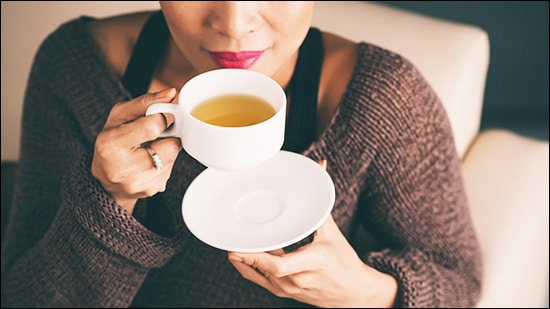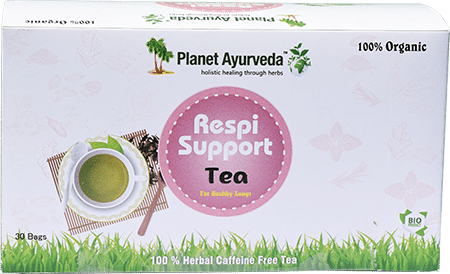Respi Support Tea – Herbal Tea for Respiratory System & Lung Health
Talking about tea I remember some really great lines that if you are cold, the tea will warm you; If you are too heated, it will cool you; If you are depressed, it will cheer you; If you are excited it will calm you.
Yes for sure, tea is the Elixir of life. At some point in our life we crave different kinds of teas according to our surroundings, according to our mood and according to our needs. Like in the chilling weather of winters many of us crave warm adrak wali chai, some want masala chai, others have heartly dedication for tulsi wali tea or kali mirch wali chai and yes all time all favourite elaichi wali chai has impact on even children. Sometimes you don’t think that tea is like an Elixir of life. Honestly, every passing day of my life reminds me that this line is so true.
But have you ever thought of a tea that is a tea but is capable of supporting the healthy functioning of your entire Respiratory system. Yes, it is possible and with thought we have something which is potion but more like a Tea and it is Respi support tea. The tea has a total of six ingredients but these six ingredients can make your respiratory system not only strong but also detoxifies it.
Our respiratory system, according to Ayurveda is a sathana of kapha dosha and all of the herbs which are included in the Respi Support Tea helps in pacification of this kapha dosha, if it aggravates or helps in maintaining the kapha dosha in sama avastha that is balanced state.
Moving forward, let’s talk about the ingredient of Respi Support Tea in detail.

Respi Support Tea Ingredients
- Cinnamon (Cinnamomum zeylanicum)
- Cardamon (Elettaria cardamomum)
- Tulsi (Ocimum sanctum)
- Ginger (Zingiber officinalis)
- Long Pepper (Piper longum)
- Licorice (Glycyrrhiza glabra)
Ingredients Description
1. Cinnamon (Cinnamomum zeylanicum)
Cinnamon is called as twak in sanskrit and dalchini in hindi. Twak is a very common ingredient that is found in Indian kitchens and has very useful properties not only for the respiratory system but for other systems too. For cinnamon there is a very famous saying that if someone asks what should your kiss be like? Then, you can answer with a smile that it should be intoxicating with a dash of sugar and a pinch of cinnamon, sweet, intense and deep. That’s what describes the taste of cinnamon and for it’s properties keep reading. It is a choice of spice in western kitchens too and has light and dying properties which means it helps with excessive mucus production in the respiratory tract. The cinnamon has kapha balancing properties and also has its effect on digestion. It is really great for eliminating endotoxins from your digestive tract which is responsible for dosha imbalance.
2. Cardamom (Elettaria cardamomum)
Cardamom is like an attitude everybody has but never wants to come across. But here cardamom has some different purposes. The spice is called a kind of spice as it has a strong, unique, soothing fragrance and aroma. The natural properties of cardamom include light and drying effects which help in kapha pacification or help in keeping kapha in balanced form. As it is having an effect on kapha dosha it also helps with the maintenance of cholesterol as it is a detoxifier as well. The seeds and oil of cardamom are digestive as well as laxative which mean it also helps in correcting the digestion whose imbalance can block the srotas and hence increases levels of kapha dosha in the body. Now you see, a small fruit can do miracles!!!
3. Tulsi (Ocimum sanctum)
A very romantic man once said to his lover that “I want you to be the tulsi of my yard”. It’s a bit odd to mention it here but the significance remains intact that yes tulsi is holy, tulsi can remind you of a romantic proposal but it is of great use for your lungs too. Tulsi has pitta vardhak property which means it increases the ushma or heat in the body and hence helps in liquefaction of accumulated kapha dosha in the body. Liquefaction of kapha frees your lungs and its cells and you can breathe better than ever.
4. Ginger (Zingiber officinalis)
Ginger reminds people who are called ginger heads or who call themselves ginger. Funny? But it does have significance. A person calling himself or herself ginger are the ones who are more strong, sharp and their words are really unpleasant but are soft at core with real sweetness in their hearts. Same is the ginger, sharp, strong with unpleasant taste but has a sweet after taste. Due to these properties the herb is a great supporter to lungs and to the whole respiratory system. It helps in enhancing the immunity and also has an ama pachana effect. Ama Pachana means it is the best thing that can detoxify your digestive system along with your respiratory system.
5. Long Pepper (Piper longum)
For long pepper, here is something that can actually relate, “A little goes a long way, and too much is a disaster”. The long pepper is anushnasheeta which means it is neither hot nor cold in potency but has a sharp and pungent taste. The herb is rakta dhatu rejuvenator and hence helps in strengthening the respiratory system really well. It also enhances the appetite and gives great results in indigestion as well. Long pepper is a very good choice as a supportive herb to lungs in chronic diseases like bronchitis, asthma etc.
6. Licorice (Glycyrrhiza glabra)
Licorice means sweet root and is derived from the latin word liquiritia. The licorice is called as madhuyashti in Sanskrit and has a sweet and unctuous property which makes it quite potent for working as an expectorant. Expectorant is something which helps in secreting the mucus from the air passages. The herb is very helpful in building lung immunity and also has a great impact as a whole respiratory system strengthener.
As now you know that RESPI SUPPORT TEA is the best formula for your respiratory system and it can surely help you in maintaining your Lung Health.
How To Use
One tea bag in 80-100ml of warm water. Let the ingredients infuse and your tea is ready. You can use it once or twice a day.




